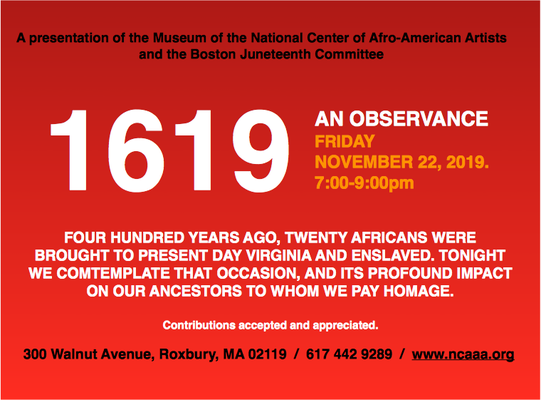
By Edmond Barry Gather, Curator and President of National Center For Afro American
This gathering recalls the sale of free-born Africans into slavery in late August of 1619 at Port Comfort near Jamestown in colonial Virginia, thereby launching four hundred years of legal slavery in what would become the United States of America.
Standing near to Eternal Presence which evokes our ancestors from the dawn of time, we acknowledge that we and the earth are the same—clay to clay, ashes to ashes, dust to dust, but for the gift to us—indeed the investment, of spirit, of breath, of ashe. Earth’s generative power renews all things and offers life abundant, so long as we respect her. Having sustained us since we were stardust, Earth now cries out, warning us of our abuses of her, and our disregard for her bounty. Will a man kill his mother? Earth poses that question in stark relief, as for short-term greed and violent domination we destroy the only environment that we have known.
In this year of 2019, the United States is called to recognize that tragic turn four hundred years ago that set in progress a dark chapter in human history—and a blight upon the history of this nation. Four hundred years ago, chattel slavery began with those first enslaved Africans sold into bondage in fledging colonial Virginia.
Though sons of Africa had been here before, coming independently in exchanges between Africa and the Americas before Columbus, and also coming with early explorers throughout the Americas, sons and daughters of Africa had not come as enslaved people devoid of dignity and humanity.
1619 is not a memorialization, nor a celebration. How could we celebrate chains put on our ankles, or yokes on our backs? Rather, 1619 marks the beginning of an awful nightmare that befell us at the birth of these United States of America. It flags the engine that would power the Middle Passage, which would rape Africa of more than 13 million souls torn from the land of their birth. Those who did not perish at sea found themselves desperate in an alien world devoid of the presence of their ancestors across a wide ocean.
Today, we remember the pain of that incomprehensible rupture, and the trauma of those who experienced it, and whose generations still suffer from its aftermath.
In remembrance, we offer this litany—this liturgy—of recollection, petition, recitation, and reverence.
We forgive our brothers, fathers and grandfathers who, like Joseph of the Old Testament, sold us into slavery in a strange land. Now is the time for truth, reconciliation and healing.
We honor our brothers, sisters, fathers and grandfathers who resisted enslavement both by Europeans and rival ethnic nations. Their bravery still burns in our blood, and calls us to action.
From our hearts, we weep for those who in Africa, and throughout the Middle Passage, who died horrific deaths at the hands of their captors and their agents. We grieve even today when we ponder the inhumanity and degradation they suffered.
Equally painfully, we empathize with those who chose death for themselves and their progeny as their route to liberty. What pain they must have felt imagining the brutality that enslavement portended for their children.
Let us herald those who chose life despite the unknown and unknowable trials that lay before them. By their choice, we are here today. They are our forebears on these shores.
With gratitude, we thank the native peoples who befriended us, and recognized our place in the family of humankind. By their action, many of us found refuge and solace from our wanton suffering.
We honor those shepherds of our spiritual lives—imams, elders, priests, priestess—who kept us linked to our creator, and to the force of our ancestors across waters.
Endowed with ashe—the gift of creativity—we grew and sustained resilience. So great was the gift of creativity that our stamp is indelibly impressed on all aspect of life, art and culture throughout not just the United States, but the whole of the Americas.
Let us celebrate those who through defiance and covert subterfuges keep us on the path to freedom. They gave us the gift of ourselves. They gave us the unwavering will to become who we should be.
We lament for those who waned under the onslaught of white supremacy and lost their balance—psychologically, morally, politically—on the tempestuous sea. They remind us of the sometimes overwhelming forces that press physical and spiritual death upon us
May we always love the children who attest to the power of life over death, and opportunity over anguish. They embody hope, and victory.
Nor should we fail to recite the names of those who by their actions advanced our cause in the world. Amongst them: the Stono Revolt rebels, Denmark Vesey, Ida B. Wells, Nat Turner, David Walker, Frederick Douglass, Harriet Tubman, WEB DuBois, Mary McLeod Bethune, Marcus Garvey, Fannie Lou Hamer, Stokeley Carmichael, Elma Lewis, Medgar Evans, Margaret Burnham, Rosa Parks, and too many more to be named.
Nor can we forget our brothers and sisters, parents and grandparents, unlettered and untutored, who by their simple acts of raising families, going to work, and persisting as communities, have sustained us as a people and constantly renewed the reservoir of our humanity.
1619 gave us the moral bread to feed the world. Who has not drawn resolve and inspiration from our struggle for freedom? What movement of the rejected has not taken lessons from our fight? From those sold on the docks of Jamestown has come spiritual, moral, artistic and humane transformations for all humankind. From the screams and cries of enslaved Africans during the Middle Passage, to the hope expressed through black spirituals, to the triumphant spirit of improvisation through jazz, the world has come to know us.
1619 foreshadowed the emergence of extraordinary resilience and creativity where none had been anticipated. 1619 could not vanquish the sacred spark evident in Lucy, our primordial ancestor, and still igniting hourly in each new child born to us.
Let us hear the power of this ascent of the spirit from moans below the slave ship’s decks, to plaintive songs in the field of the South, to the birth of jazz, the source of modern music globally. It this evolution resides our story.
